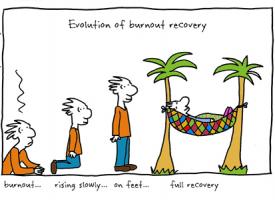Part 2 Burn Out and Coping Strategies for Recovery

This week I would like to go deeper into some of the Burnout strategies I have suggested and why you would do them. Whether you recognize the warning signs of impending burnout or you’re already past the breaking point, trying to push through the exhaustion and continuing as you have been will only cause further emotional and physical damage.
When you’re on the road to burnout, you can feel helpless. But you have a lot more control over stress than you may think. There are positive steps you can take to get your life back into balance and overcome burnout. The first step is to pull your life back and simplify everything as much as you can. So SLOW DOWN!!
One of the most effective strategies is to reach out to others because social contact is nature’s antidote to stress. Since the face and heart are wired together in the brain, talking face to face with a good listener can help to quickly calm your nervous system and relieve stress. The person you talk to doesn’t have to be able to “fix” your stress, they just need to be someone who’ll listen attentively without being distracted or judging you. Two important things to remember here are:
- Choose someone who has earned the right to hear your story, as not all people are understanding and good listeners.
- The purpose is to reach out to be proactive about your Burnout. This does not mean to tell your sad story over and over again, without putting some of the strategies offered in place. Only you can get you to recovery and sharing your story and being listened to is a support to help you on your way.
Tips for combating burnout with positive relationships
- Nurture your closest relationships and try to make the time you spend with your loved ones positive and enjoyable. Spend less time doing whatever it is that is burning you out.
- Be more sociable or develop friendships with your coworkers, as this can help buffer you from job burnout. When you take a break, you could connect with your colleagues instead of playing on your phone. At this stage, avoid negative people or those who complain a lot.
- Connect with a community group that is personally meaningful to you such as a religious, social or support group. This can give you a place to talk to like-minded people and to make new friends.
If you don’t feel that you have anyone to turn to, it’s never too late to build new friendships and expand your social network.
Change the way you look at work
If you have an unfulfilling job or you are rushed off your feet, the best thing to do is quit and find a new job . If this isn't possible, there are still things you can do to improve your state of mind.
- Try to find some value in what you do by focusing on how what you do helps others or provides a much needed product or service. Focus on aspects of the job that you do enjoy and you will find that by changing your attitude you regain a sense of purpose and control.
- Find balance in your life. If you hate your job, look for meaning and satisfaction within your family, friends or hobbies. Focus on the parts of your life that bring you joy.
- Make friends at work, as having friends to chat and joke with during the day can help relieve stress, improve your job performance and get you through the day.
- Take a complete break off work, if burnout seems inevitable. Use the time away to recharge your batteries and to focus burnout recovery steps.
Reevaluate priorities
Burnout is an undeniable sign that something important in your life is not working. Take time to think about your hopes, goals, and dreams. Are you neglecting something that is truly important to you? Burnout can be an opportunity to rediscover what really makes you happy and to slow down and give yourself time to rest, reflect, and heal.
- Set boundaries and don't overdo it. Learn how to say “no” to requests on your time. This allows you to say “yes” to the things that you truly want to do.
- Take a daily break from technology by setting a time each day when you completely disconnect from your laptop, phone, and emails.
- Nourish your creative side as creativity is a right brained activity and is a powerful antidote to burnout. Try something new or resume a favorite hobby. Choose activities that have nothing to do with work.
- Set aside relaxation time as relaxation techniqus such as yoga, meditation, and deep breathing activate the body’s relaxation response, a state of restfulness that is the opposite of the stress response.
- Get plenty of sleep as this allows the mind body to heal and your health to improve at a quicker rate.
Make exercise a priority
Even though it may be the last thing you feel like doing when you’re burned out, exercise is a great reliever of stress. It’s also something you can do right now to boost your mood.
- You could aim to exercise for 30 minutes or more per day or every other day.
- Rhythmic exercise is an effective way to lift your mood, increase energy, sharpen focus, and relax both the mind and body. Try walking, running, weight training, swimming, martial arts or dancing.
- As you exercise, instead of focusing on your thoughts, focus on your body and how it feels as you move. Feel the sensation of your feet hitting the ground or the wind on your skin.
Support your mood and energy levels by eating a healthy diet
What you put in your body can have a huge impact on your mood and energy levels throughout the day.
- Minimize sugar and refined carbs. You may crave sugary snacks, pasta or fries, but these high-carbohydrate foods quickly lead to a crash in mood and energy.
- Reduce your high intake of foods that can adversely affect your mood, such as caffeine, trans fats, and foods with chemical preservatives or hormones.
- Eat more Omega-3 fatty acids to give your mood a boost. The best sources are fatty fish (salmon, herring, mackerel, anchovies, sardines), seaweed, flaxseed, and walnuts.
- Avoid nicotine. Smoking when you're feeling stressed may seem calming, but nicotine is a powerful stimulant, leading to higher, not lower, levels of anxiety.
- Drink alcohol in moderation. Alcohol temporarily reduces worry, but too much can cause anxiety as it wears off.




